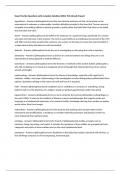Exam Practice Questions with complete Solutions EDUC 703 Already Passed
agnosticism - Answers (philosophical term) the view that the existence of God, of the divine or the
supernatural is unknown or unknowable. Another definition provided is the view that "human reason is
incapable of providing sufficient rational grounds to justify either the belief that God exists or the belief
that God does not exist."
deism - Answers (philosophical term) belief in the existence of a supreme being, specifically of a creator
who does not intervene in the universe. The term is used chiefly of an intellectual movement of the 17th
and 18th centuries that accepted the existence of a creator on the basis of reason but rejected belief in
a supernatural deity who interacts with humankind.
dialectic - Answers (philosophical term) the art of investigating or discussing the truth of opinions.
dichotomy - Answers (philosophical term) a division or contrast between two things that are or are
represented as being opposed or entirely different.
eclecticism - Answers (philosophical term) the theories or methods of the ancient Eclectic philosophers,
who did not belong to or found any recognized school of thought but selected doctrines from various
schools of thought.
epistemology - Answers (philosophical term) the theory of knowledge, especially with regard to its
methods, validity, and scope. Epistemology is the investigation of what distinguishes justified belief from
opinion. Questions relating to the nature of truth and how it is acquired.
faith - Answers (philosophical term) complete trust or confidence in someone or something. strong
belief in God or in the doctrines of a religion, based on spiritual apprehension rather than proof.
logocentrism - Answers (philosophical term) a term coined by the German philosopher Ludwig Klages in
the early 1900s. It refers to the tradition of Western science and philosophy that regards words and
language as a fundamental expression of an external reality. Knowledge deriving from written or spoken
words rather than from images
materialism - Answers (philosophical term) the doctrine that nothing exists except matter and its
movements and modifications. a tendency to consider material possessions and physical comfort as
more important than spiritual values.
ontology - Answers (philosophical term) the branch of philosophy that studies concepts such as
existence, being, becoming, and reality. It includes the questions of how entities are grouped into basic
categories and which of these entities exist on the most fundamental level.
pantheism - Answers (philosophical term) Pantheism is the belief that reality is identical with divinity, or
that all-things compose an all-encompassing, immanent god.
, reason - Answers (philosophical term) in philosophy, the faculty or process of drawing logical inferences.
... Reason is in opposition to sensation, perception, feeling, desire, as the faculty (the existence of which
is denied by empiricists) by which fundamental truths are intuitively apprehended.
teleology - Answers (philosophical term) the explanation of phenomena in terms of the purpose they
serve rather than of the cause by which they arise. Teleology or finality is a reason or explanation for
something as a function of its end, purpose, or goal, as opposed to as a function of, say, its cause. A
purpose that is imposed by a human use, such as that of a fork, is called extrinsic.
behaviorism - Answers (more of a method than a theory; leans toward transmission). B.F. Skinner's
behavior modification. We usually pair this as a tool to use with "essentialism"
critical pedagogy - Answers (theory that leans more toward transformation) Paulo Freire, a social
activist, educator, and philosopher. Freire contributed a philosophy of education which blended classical
approaches stemming from Plato and modern Marxist, post-Marxist, and anti-colonialist thinkers. His
Pedagogy of the Oppressed (1968) can be read as an extension of, or reply to, Frantz Fanon's The
Wretched of the Earth (1961), which emphasized the need to provide native populations with an
education which was simultaneously new and modern, rather than traditional, and anti-colonial - not
simply an extension of the colonizing culture. Freire considered the contemporaneous Chinese Cultural
Revolution an exemplar of his notion of cultural action and praised Mao Zedong's innovations to Marxist
theory and praxis. These carried the baton from Friere: Peter McLaren, Henry Giroux, Bell Hooks (Gloria
Watkins) by being social activists. They're different from the original progressives, the
resconstructionists, in that they've brought in more of the Marxist element (this idea that the main form
of education is to identify oppression and fight it; to stand against it in solidarity with those who are
oppressed either by poverty or by being marginalized; they believe that educators need to take a stand
in that).
essentialism - Answers (theory that leans more toward transmission) about facts, knowledge, and skills
existentialism - Answers (philosophies/theories) a form of philosophical inquiry that explores the
problem of human existence and centers on the lived experience of the thinking, feeling, acting
individual.
idealism - Answers (philosophies/theories) Plato. In philosophy, idealism is a diverse group of
metaphysical views which all assert that "reality" is in some way indistinguishable or inseparable from
human perception and/or understanding, that it is in some sense mentally constituted, or that it is
otherwise closely connected to ideas.
neo-scholasticism - Answers (philosophies/theories) a revival and development of medieval
scholasticism in Roman Catholic theology and philosophy which began in the second half of the 19th
century.




